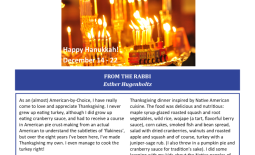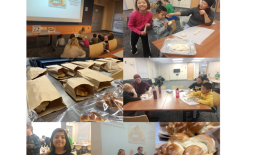Judaism and The Year of the Plague
‘Baruch Ata Adonai, Eloheinu Melech ha’Olam, she’asani Yisrael.’ – ‘Blessed are You, Eternal our God, Who has made me a Jew.’
This line from the morning service has been on my mind a lot lately, but not for the reasons you may think. It’s a blessing that can easily be interpreted as problematic to say the least. Does this preach Jewish superiority or affirm a condescending particularism? Maybe some of us may feel a degree of discomfort or embarrassment when we recite this brachah. Others may feel a budding pride or an abiding sense of belonging. I have felt all of the above, but at the moment, feel a poignant, strange and intense sense of gratitude.
This gratitude is not a simple, unalloyed feeling of joy. This is a weighty and existential sense of gratitude, rooted in the raw experience of having lived through and survived this past year. Because frankly, among the darkness and despair, the cynicism and rage that I have felt, I don’t know how I could have gotten through this year without our Judaism.
Remembering the one year anniversary, or perhaps better put, the ‘yahrtzeit’ of the pandemic calls for solemn reflection. We have lost more than half a million people in this country alone. While there is hope in science and we can see the light at the end of the tunnel, much is still uncertain and many are stricken by illness and loss. Solemn words have been offered in civic, secular and religious contexts; in visual and print media and in the hearts of all of us as we come to terms with this moment. It is difficult finding the words as we face the magnitude of what we are living through. So I am choosing to bring a quiet yet confident gratitude to this time of solemnity.
I am so very grateful to be a Jew and for our Jewish community.
Time feels fragmented and fluid at once, as we battle isolation and stress. It feels like ‘eternally March 2020’, in a way that one of the prayer books we use in our service describes being in a state of ‘eternally Egypt.’ Yet it is Judaism that structures our time and orders our days. I am grateful for the contrast between weekdays and Shabbat, for watching the hours turn within the wheel of Jewish sanctity. While this will be the second Pesach that we are on Zoom, completing a full liturgical year on the medium rather than in-person, I am so grateful for the life-affirming nature of our holidays. In an empty sanctuary for the High Holidays, and from our living rooms, we felt each other’s presence. During Hanukkah, we were all heartened by seeing our hanukkiyot light up our social media feeds. The cacophony of unmuted Zoom booing proved to be perfect for blotting out Haman’s name.
While I am grateful to God, and to our rituals and prayers and the wise texts of our tradition, I am particularly grateful for holy community; a covenant of values, a citadel of compassion and decency that has withstood the assaults leveraged against it in a time such as this. Maybe it is hard to feel the presence of the Divine amidst so much suffering, but I have felt God’s presence in our response. I have seen holiness in our steadfastness. We closed down fast and rallied our resources to go online. I am grateful for the constancy of your attendance and engagement and encouraged by your kindness and thoughtfulness. There was never a glimmer of doubt about what our mission was: preserving life. In small, unseen ways, we took care of each other. We dropped off prayer books and food, made phone calls and sent cards. Donations to the rabbinic discretionary fund allowed us to ‘pay it forward’, to support those among us who need support, our Judaic version of a mutual aid society. Our Tikkun Olam Committee has been working tirelessly to support food security in our area, to further the cause of racial justice and to protect immigrants. Our educational programs kept going, providing much-needed companionship and intellectual stimulation. Our community stepped up to the plate in ways I had not dared anticipate and every time I launch the Zoom meeting, I am so thankful to see your faces on the screen, knowing that we have built a virtual tabernacle, a holy site in a parallel universe of pixels and binary code.
I am grateful to our wise and compassionate tradition for emphasizing life, embracing evidence-based science and for rising above the fray. In a time where many of us may feel battered by the intensity of opinion and the fierceness of divisiveness, Judaism grounds us. It whispers in our ears, in a gentle and ancient tongue, that this too shall pass, and that wrapping our arms around each other to preserve each other are our true prayers before the Throne of Glory.
Today, we read a double portion, Parashat Vayakhel-Pekudei. Normally, this is the province of synagogue treasurers and fundraisers to appeal to the generosity of synagogue members. We are reminded that the people gathered and gave, with open hearts. But now, these are the words I give back to you. I feel called to sing a love-song to our covenant people, our Torah and God. There is subtle and implicit wisdom in the portion. After the trauma of Ki Tissa, the incident with the Golden Calf, Moses gathers the people. We do not remain isolated, but are brought together again. And the first commandment that we are offered after the rifts have been torn is Shabbat. And I don’t think that this is accidental.
Shabbat is the balm to our world-weary souls, as Rabbi Abraham Joshua Heschel famously described it, ‘a palace in time’. Judaism has stored historical trauma in its muscle memory. Our liturgy and text testify to this; our lived experiences and stories bring this to life. Yet, like our ancestors who came out of Egypt, shell-shocked and broken, the gift of Shabbat allowed them to move through the pain and find healing and build the world anew. It is this portion that makes an important ‘asmachta’, the joining of two adjacent Biblical concepts for the sake of rabbinic interpretation. It is the proximity of the commandment to keep Shabbat and the instructions of the Tabernacle that led the Rabbis to device the laws and structures of Shabbat, the so-called 39 ‘avot melachah’, work restrictions that from a traditional perspective allowed for the building of the palace in time.
A year on from the start of pandemic, I know that Ahad ha’Am’s dictum is true: more than that the Jew has kept Shabbat, Shabbat has kept the Jew. We do not know when the pandemic will be brought to heal. We have not yet mourned all our dead, comforted the bereaved and healed the sick. The road still rises before us, difficult and uncertain times still lie ahead. Still, I am profoundly grateful that we have each other by our side, that our small, plucky, stalwart community continues to build and dream and is uncompromising in our ethical imperative to protect the vulnerable while doing so. To find friendship and connection in the tiles of our screens, fortitude in ancient words. We may be alone during this pandemic, but we are not lonely. For all this, my heart overflows.
From the morning service yet again: ‘Ashreinu mah tov chelkeinu u’mah na’im goralinu u’mah yafah yerushateinu.’ – ‘How blessed we are: how goodly is our portion, how delightful our lot, how beautiful our inheritance.’ I am proud of all of us. We have made it this far. One day, we will open the doors of our synagogue again and share our beautiful tradition with those who seek it. We will offer wisdom and welcome, healing and holiness. Out of the wilderness and through the pain, we will rebuild something old and build something new.




